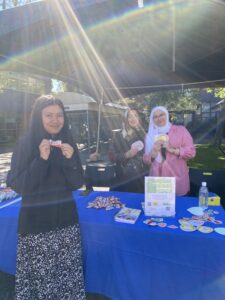Practicing a religion that isn’t part of the dominant culture of where you live can be lonely, as was the experience for Muslim student Leia Grace Elaine Unarce.
This is why Unarce restarted Camosun’s Muslim Students Alliance after it had been inactive for a few years, following a thought she had while breaking her fast during Ramadan.
“It was my first Ramadan here. And it’s a little bit challenging for me that time because, you know, in Wilna Thomas building there’s quiet rooms over there. So that’s the place I found to break my fasting to eat because I was hungry, I was thirsty [the] whole day. And I was eating there so quick and hoping to pray in the quiet room before returning to my classes,” she says. “But the thing is that [a person] scold me in a nice way, reminding me that you can’t actually eat here.”

Her next step was to do some digging on what might already exist, but what she found was out of the way and inconvenient.
“It made me think, like, am I the only one experiencing this?” she says. “So, I found out that, of course in the Richmond [House] there is a prayer room upstairs, which I will not go alone at like 7 pm or 8 pm… So I reached to some sisters and brothers in the same religion and then they said, ‘Yeah, we don’t know, we just tend to go home.’”
Feeling the disconnect happening, Unarce didn’t just accept the situation—she took action.
“I know that there is a place for the prayer, but I think the community is not that close together in Camosun,” she says. “I feel that I had to do something about it.”
For Muslims, community isn’t just a nice thing to have, it’s also a central part of their religious practice.
“We pray five times a day,” she says. “And when we pray, actually, alone, it’s not okay. It’s better if we are with others.”
She says the club has helped build some of that necessary community back up.
“Like, hey, is it your break time? Should we pray together? That is, you know, powerful in itself, knowing that you can go into the prayer room, not alone, and pray with other students,” says Unarce. “It gives a sense of community, which I feel is lacking for us.”
With the club up and running, its members are hoping to build enough awareness and community in time for the event that started the club: Ramadan.
“We’re trying to plan about the next Ramadan… I hope we can organize one iftar. Iftar is the dinner after a whole day of fasting. And yeah, it could be attended by anyone with the fasting students or with others as well that, you know, just want to know about what is happening or what is the importance of that celebration for us.”
The club exists to build community for Muslim students, but not just with each other. Students of other religious backgrounds are welcome to join in, and Unarce hopes to encourage inter-religious discussions and connections.
“The purpose of the club is to make students feel welcome, to make the students feel that their identity or their religion or their culture is being accommodated or it helps on their adjustment in a new culture, in a new school,” she says. “So, yeah, and at the same time, we’re hoping that it would not only contribute as well to the Muslim community, but to others as well… People can still connect with each other, even [if] we have [a] different religion. It should not be a barrier to stop us from being friends.”
